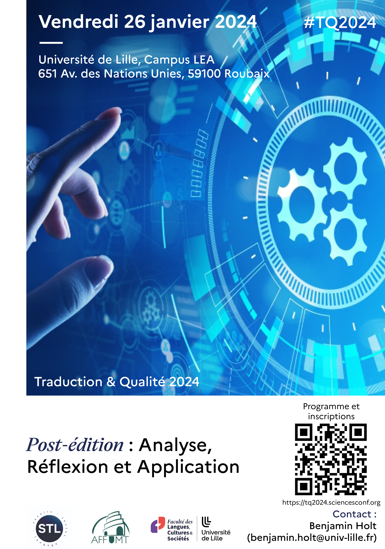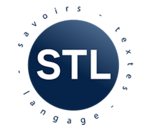
Following the 2008, 2010, 2014, 2016, 2018, 2020, and 2022 editions, TQ2024 will be the ninth conference devoted to the question of quality in translation. The 2018 and 2020 editions were devoted to the use of automatic translation by professional translators, and the relationship between human translation and machine translation. The 2022 edition (“How should we teach (with) automatic translation?”) set out to demystify student use of online automatic translators in the context of foreign language education.
Since machine translation can be of higher or lower quality than human translation depending on context and methods of analysis, translators must learn to work hand in hand with the machine (Hernandez Morin & Barbin, 2021). The theme of TQ2024 will therefore be post-editing as well as revision since there is not always a clear distinction between the two. These tasks, which are becoming increasingly important in the translation industry, require skills that are sometimes similar, sometimes different (Robert, Ureel & Schrijver, 2023). In an academic context, post-editing can help students to earn better grades (Schumacher & Sutera, 2022), but still requires increased attention and awareness in language and translation classes because students are often unable to detect the errors produced by the machine (Volkart, Girletti, Gerlach, Mutal, & Bouillon, 2022; Loock, Holt & Léchauguette, 2022). Neural machine translation therefore requires students to develop a critical approach to these tools as well as sophisticated metalinguistic competence, which makes language teaching all the more necessary (Bénard, Bordet & Kübler, 2022). Post-editing is a skill that must be mastered not only by students but also by professionals, whose careers are evolving with the technology (Varela Salinas & Burbat, 2023). This conference will therefore feature presentations from industry professionals as well as academics working in this field.
References
Bénard, M., Bordet, G., & Kübler, N. (2022). Réflexions sur la traduction automatique et l’apprentissage en langues de spécialité. ASp, 81‑98.
Hernandez Morin, K., & Barbin, F. (2021). Collaboration homme-machine dans la traduction des métadonnées en SHS : expérience de traduction automatique post-éditée pour quatre revues françaises. La main de Thôt.
Loock, R., Holt, B., & Léchauguette, S. (2022). Dealing with the “elephant in the classroom”: Developing language students’ machine translation literacy Australian Journal of Applied Linguistics 5 (3), pp.118-134.
Robert, I., Ureel, J. J., & Schrijver, I. (2023). Translation, translation revision and post-editing competence models: Where are we now? In G. Massey, E. Huertas-Barros, & D. Katan (Éds.), The human translator in the 2020s (p. 44‑59). London ; New York: Routledge Taylor Francis Group.
Schumacher, P., & Sutera, A. (2022). Analyse Comparative de post-édition et de traduction humaine en contexte académique. In C. Expósito Castro, M. del M. Ogea Pozo, & F. Rodríguez Rodríguez (Éds.), Theory and practice of translation as a vehicle for knowledge transfer. Universidad de Sevilla.
Varela Salinas, M.-J., & Burbat, R. (2023). Google Translate and DeepL: Breaking taboos in translator training: Observational study and analysis. Ibérica, 243‑266.
Volkart, L., Girletti, S., Gerlach, J., Mutal, J. D., & Bouillon, P. (2022). Source or target first? Comparison of two post-editing strategies with translation students. Journal of Data Mining & Digital Humanities.

Organizing committee :
Benjamin Holt (organizer): benjamin.holt@univ-lille.fr
Rudy Loock: rudy.loock@univ-lille.fr
Justin Duquesnoy (STL research centre): justin.duquesnoy@univ-lille.fr
